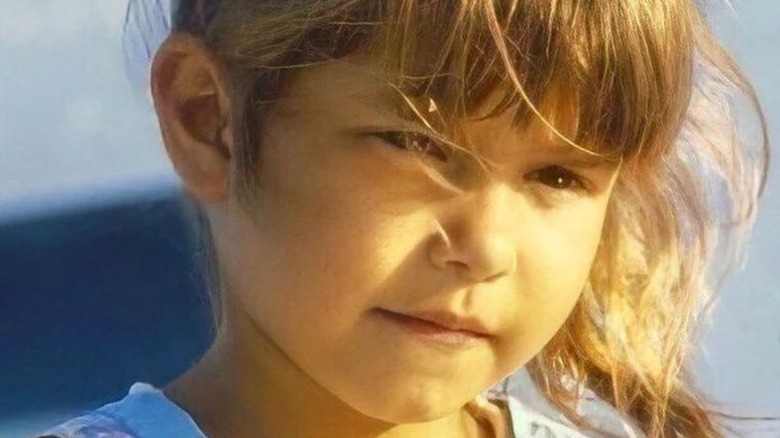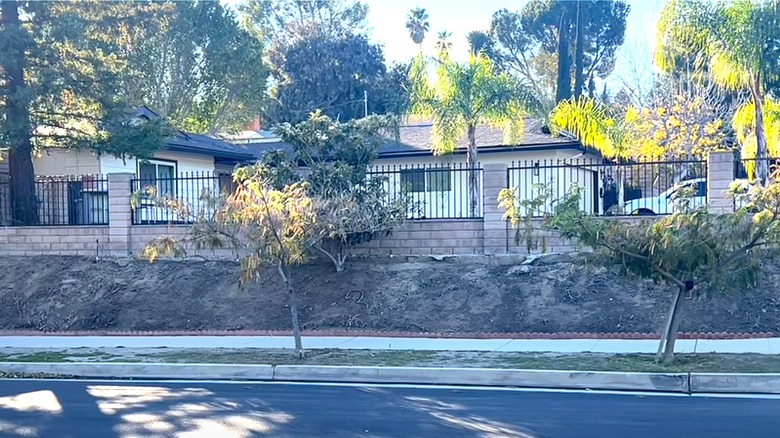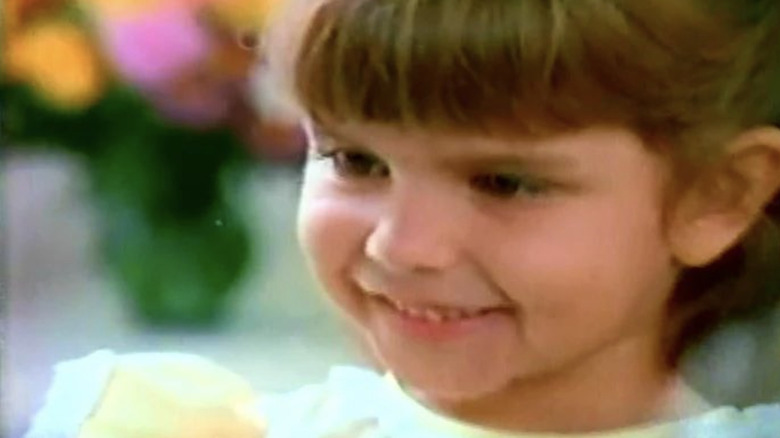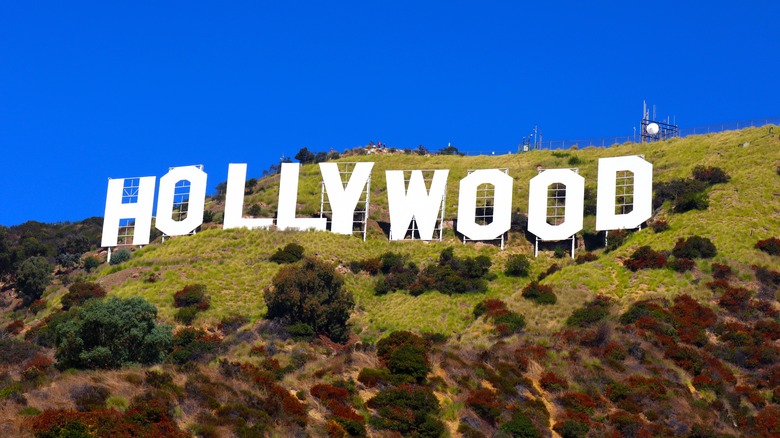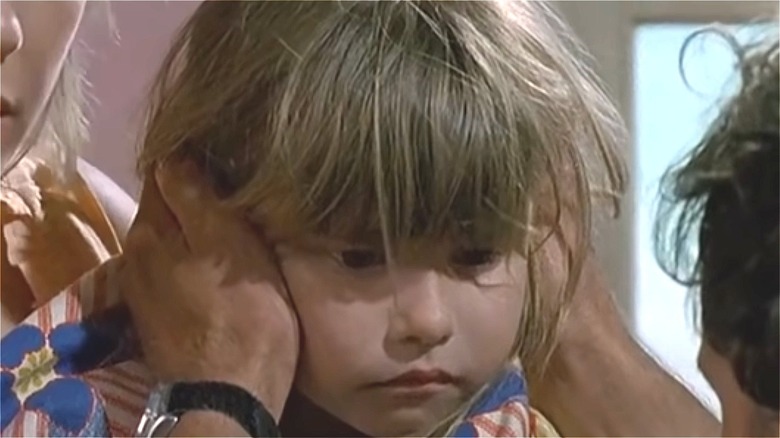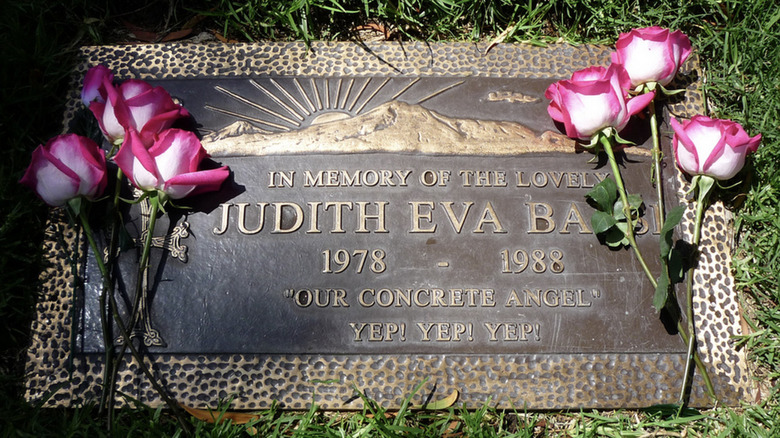The Tragedy Of Child Star Judith Barsi Explained
The life of a child star isn't as glamorous as one might think. There can be exploitative working conditions, a sense of isolation, and for many, an inability to deal with fame and money. It's not unusual for former child stars to end up serving time behind bars, experience addiction issues, and sometimes die way too young. For the child actor Judith Barsi, best known for her roles in "Jaws IV: The Revenge" and the television mini-series "Fatal Vision," her death came at the hands of the man who was supposed to keep her from harm.
On the morning of July 27, 1988, an explosion rocked a quiet street in the West Hills neighborhood of Los Angeles. Jets of flame shot out of the windows of the one-story home of Maria and József Barsi. As a neighbor, Eunice Daly, called 911 she thought to herself: "He's done it. He's killed them and set a fire in the house, just like he said he would" (via The Tyler Courier-Times). József Barsi murdered his own daughter just as her budding Hollywood career was heating up.
Judith Barsi shot in bed
When firefighters were finally able to put out the raging fire at the Barsi house, police found a shocking crime scene inside the heavily damaged interior. In a hallway, they discovered the body of Maria Barsi. She'd been shot in the head and her body doused in gasoline before being set alight. In Judith Barsi's bedroom, they found the 10-year-old's burned corpse. She was lying in bed and had also been shot in the head and covered in gasoline.
In the garage, investigators found József Barsi. He'd shot himself in the head with a .32 caliber pistol. A gas can lay near his body. "It looks to me as if the male found in the garage caused the death of the other adult and the child and then apparently killed himself," a Los Angeles Police spokesperson told the Los Angeles Times in 1988. Barsi had become another child star who died in a bizarre way, but one that likely could have been prevented.
Judith Barsi was born to act
Judith Barsi was born in Los Angeles on June 6, 1978. Her parents, Maria and József Barsi, had emigrated from Hungary separately and met in the United States. Judith began her acting career at a very young age and by the time of her death had appeared in some of the best-known 1980s television shows, including "Cagney & Lacey," "Growing Pains," "St. Elsewhere," "Cheers," and "The Love Boat."
In one memorable television role, Judith portrayed Kimberly MacDonald in the NBC mini-series "Fatal Vision." The show dramatized the true story of U.S. Army Capt. Jeffrey MacDonald who was convicted of murdering his pregnant wife and two young daughters at Fort Bragg (now called Fort Liberty) in North Carolina. MacDonald blamed hippies for the killings and still maintains his innocence. Barsi portrayed MacDonald's youngest daughter who he stabbed to death. The role eerily echoed what her own father would do to her only a few years later.
A rising star and an angry father
Judith Barsi also began acting in films. She played Thea Brody in "Jaws IV: The Revenge" and voiced roles in the animated films "The Land Before Time" and "All Dogs Go to Heaven." "She was very successful, with every door open to her," Bonnie Gold, a representative from Judith's management company, told The Los Angeles Times in 1988. "There's no telling how far she would have gone." Sadly, both "The Land Before Time" and "All Dogs Go to Heaven" came out after Judith's death. While Judith's career was flourishing, things at home were getting worse and worse.
József Barsi, known to his friends as "Arizona Joe" was a 55-year-old plumbing contractor, who continued working even as his daughter Judith's $100,000-a-year acting career took off and helped pay for the three-bedroom home he would later set on fire. He was controlling and verbally abusive to both his wife and daughter and more so when he drank excessively. In the last year of their lives, his abusive behavior escalated. József threatened to slit Judith's throat just before she left to work on the "Jaws" sequel in 1987, according to the LA Times.
Judith Barsi suffered psychological abuse
József Barsi had been making threats to kill his wife and their only child for several years, but by 1988, with he and Maria's relationship completely deteriorating, it seemed that he was steadily moving towards going through with these threats. In December 1986, Maria filed a police report alleging both mental and physical abuse, but because police didn't see any physical injuries they dropped the case.
Per the LA Times as József's rage began to shift to his daughter, Judith began plucking out her eyelashes, feared going home, and was prone to hysterical crying. Her agent, Ruth Hansen, noticed the change in Judith's behavior and pushed Maria to take Judith to a child psychologist. Eventually, the Los Angeles Department of Children's Services became involved. The agency closed its file on the case after Maria got a new apartment. She also had plans to divorce her husband. Still, Maria refused to pull the trigger on leaving József, which turned out to be a fatal mistake for both her and her daughter.
LA Department of Children's Services criticized
In the wake of Judith and her mother's tragic murders, the city government took the Los Angeles Department of Children's Services to task for dropping the Barsi case too soon, especially in light of what family friends, Judith's therapist, and her agent told the department about the on-going abuse. The department blamed its lack of action on being understaffed and underfunded and its mistaken belief that Maria Barsi was leaving her abusive husband and moving into a new apartment with Judith.
Unfortunately, child actors have often ended up being exploited by both the industry and even their own parents, whether financially or in other ways. Over the years, California has attempted to stop this malicious behavior by adults with power over child actors. The first was the passage of the 1936 California Child Actor's Bill which prevented parents from spending their children's money earned through acting. Then, in 2020, California began requiring businesses working with minors to report any alleged child abuse, which came 30 years too late to save Judith.
If you or someone you know may be the victim of child abuse, please contact the Childhelp National Child Abuse Hotline at 1-800-4-A-Child (1-800-422-4453) or contact their live chat services.
